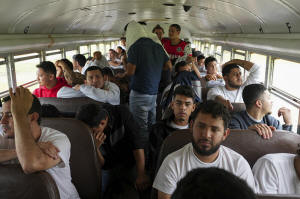As Trump threatens mass deportations, Central America braces for an
influx of vulnerable migrants
 Send a link to a friend
Send a link to a friend
 [December 16, 2024]
By MEGAN JANETSKY [December 16, 2024]
By MEGAN JANETSKY
SAN PEDRO SULA, Honduras (AP) — As dozens of deported migrants pack into
a sweltering airport facility in San Pedro Sula, Norma sits under
fluorescent lights clutching a foam cup of coffee and a small plate of
eggs – all that was waiting for her in Honduras.
The 69-year-old Honduran mother had never imagined leaving her Central
American country. But then came the anonymous death threats to her and
her children and the armed men who showed up at her doorstep threatening
to kill her, just like they had killed one of her relatives days
earlier.
Norma, who requested anonymity out of concern for her safety, spent her
life savings of $10,000 on a one-way trip north at the end of October
with her daughter and granddaughter.
But after her asylum petitions to the U.S. were rejected, they were
loaded onto a deportation flight. Now, she's back in Honduras within
reach of the same gang, stuck in a cycle of violence and economic
precarity that haunts deportees like her.
“They can find us in every corner of Honduras,” she said in the migrant
processing facility. “We’re praying for God’s protection, because we
don’t expect anything from the government.”
Now, as U.S. President-elect Donald Trump is set to take office in
January with a promise of carrying out mass deportations, Honduras and
other Central American countries people have fled for generations are
bracing for a potential influx of vulnerable migrants — a situation they
are ill-prepared to handle.

‘We don’t have the capacity'
Honduras, Guatemala and El Salvador, which have the largest number of
people living illegally in the U.S., after Mexico, could be among the
first and most heavily impacted by mass deportations, said Jason Houser,
former Immigration & Customs Enforcement chief of staff in the Biden
administration.
Because countries like Venezuela refuse to accept deportation flights
from the U.S., Houser suggests that the Trump administration may
prioritize the deportation of “the most vulnerable” migrants from those
countries who have removal orders but no criminal record, in an effort
to rapidly increase deportation numbers.
“Hondurans, Guatemalans, Salvadorans need to be very, very nervous
because (Trump officials) are going to press the bounds of the law,”
said Houser.
Migrants and networks aiding deportees in those Northern Triangle
countries worry their return could thrust them into even deeper economic
and humanitarian crises, fueling migration down the line.
“We don’t have the capacity” to take so many people, said Antonio García,
Honduras' deputy foreign minister. “There’s very little here for
deportees." People who return, he said, "are the last to be taken care
of.”
Making their way back to the US
Since 2015, Honduras has received around half a million deportees. They
climb down from planes and buses to be greeted with coffee, small plates
of food and bags of toothpaste and deodorant. While some breathe a sigh
of relief, free from harsh conditions in U.S. detention facilities,
others cry, gripped with panic.
“We don’t know what we’ll do, what comes next,” said one woman in a
cluster of deportees waiting for their names to be called by a man
clacking at a keyboard.
Approximately 560,000 Hondurans, about 5% of the country's population,
live in the U.S. without legal status, according to U.S. government
figures. Of those, migration experts estimate about 150,000 can be
tracked down and rapidly expelled.
While García said the government offers services to help returnees, most
are released with little aid into a country gripped by gangs. They have
few options for work to pay off crippling debts. Others like Norma have
nowhere to go, unable to return home because of the gang members
circling her home.
Norma said she’s unsure of why they were targeted, but she believes it
was because the relative who was killed had problems with a gang.
Despite the crackdown, García estimates up to 40% of Honduran deportees
make their way back to the U.S.

[to top of second column]
|

Honduran migrants who were deported from the U.S. sit on a bus after
arriving at Ramon Villeda Morales Airport, in San Pedro Sula,
Honduras, Wednesday, Dec. 4, 2024. (AP Photo/Moises Castillo)

A looming humanitarian crisis
Larissa Martínez, 31, is among those who have struggled to
reintegrate into Honduran society after being deported from the U.S.
in 2021 with her three children. Driven by economic desperation and
the absence of her husband, who had migrated and left her for
another woman, the single mother sought a better life in the U.S.
Since her return to Honduras, Martínez has spent the past three
years searching for a job, not just to support her kids, but also to
pay off the $5,000 she owes to relatives for the trip north.
Her efforts have been unsuccessful. She built a wobbly wooden home
tucked away in the hilly fringes of San Pedro Sula, where she sells
meat and cheese to get by, but sales have been slim and tropical
rains have eaten away at the flimsy walls where they sleep.
So she's begun to repeat a chant in her head: “If I don’t find work
in December, I’ll leave in January.”
César Muñoz, a leader at Mennonite Social Action Commission, said
Honduran authorities have abandoned deportees like Martínez, leaving
organizations like his to step in. But with three deportation
flights arriving weekly, aid networks are already stretched thin.
A significant uptick could leave aid networks, migrants and their
families reeling. Meanwhile, countries like Honduras, heavily
reliant on remittances from the U.S., could face severe economic
consequences as this vital lifeline is cut.
“We’re at the brink of a new humanitarian crisis,” Muñoz said.
Trump’s return has been met with a range of reactions by Latin
American nations connected to the U.S. through migration and trade.
Guatemala, a country with more than 750,000 citizens living
unauthorized in the U.S. , announced in November it was working on a
strategy to take on potential mass deportations. Mexican President
Claudia Sheinbaum said Mexico is already beefing up legal services
in its U.S. consulates and that she would ask Trump to deport
non-Mexicans directly to their countries of origin.
Honduras’ Deputy Foreign Minister García expressed skepticism about
Trump’s threat, citing the economic benefits immigrants provide to
the U.S. economy and the logistical challenges of mass deportations.
Aid leaders like Muñoz say Honduras isn’t sufficiently preparing for
a potential surge in deportations.

Even with a crackdown by Trump it would be “impossible” to stop
people from migrating, García said. Driven by poverty, violence and
the hope for a better life, clusters of deportees climb aboard buses
on their way back to the U.S.
As deportations by both U.S. and Mexican authorities spike,
smugglers are offering migrants packages in which they get three
tries to make it north. If migrants get captured on their journey
and sent back home, they still have two chances to get to the U.S.
Freshly returned to Honduras, 26-year-old Kimberly Orellana said she
spent three months detained in a Texas facility before being sent
back to San Pedro Sula, where she waited in a bus station for her
mother to pick her up.
Yet, she was already planning to return, saying she had no choice:
her 4-year-old daughter Marcelle was waiting for her, cared for by a
friend in North Carolina.
The two were separated by smugglers crossing the Rio Grande, in
hopes to increase their chances of successfully crossing over.
Orellana vowed to her daughter that they would be reunited.
“Mami, are you sure you’re coming?” Marcelle asks her over the
phone.
“Now, being here it’s difficult to know if I’ll ever be able to
follow through with that promise,” Orellana said, clinging to her
Honduran passport. “I have to try again. … My daughter is all I
have.”
All contents © copyright 2024 Associated Press. All rights reserved |